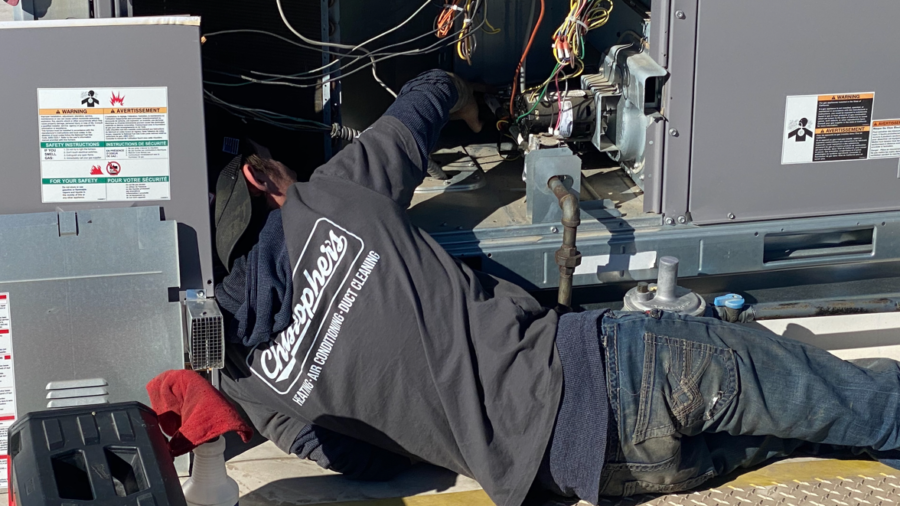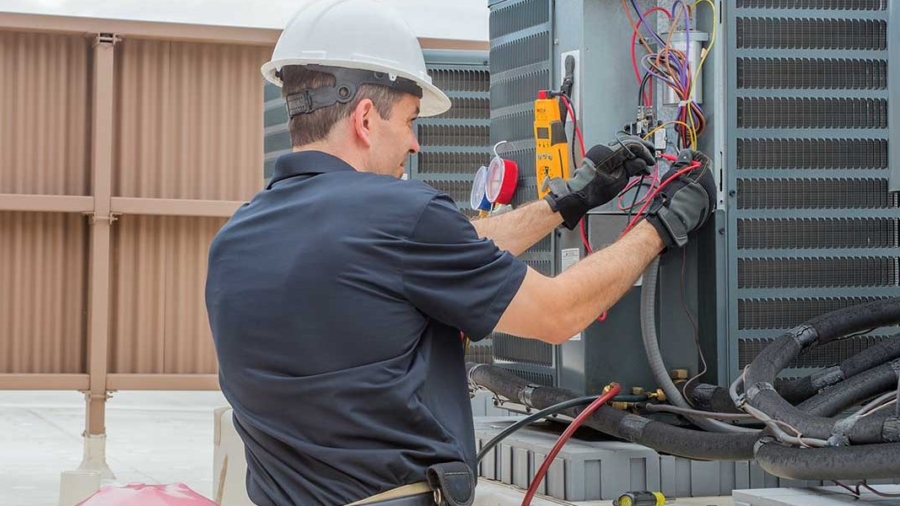What is a Boiler?
A boiler is a crucial component in a heating system that is responsible for generating hot water or steam for various industrial, commercial, or residential purposes. Essentially, a boiler works by heating water or other fluids to create steam, which is then circulated through a network of pipes to provide heat or hot water to a building. Boilers can be fueled by various sources, including natural gas, oil, electricity, and even renewable energy sources like biomass. Understanding the basics of how a boiler operates is essential for anyone working in the heating and cooling industry, as well as for homeowners looking to maintain or replace their current boiler system.
The Benefits of Regular Boiler Maintenance
Regular boiler maintenance offers several benefits, including cost savings from reducing unexpected breakdowns and avoiding costly boiler repairs or replacements. By ensuring that the boiler is in good working condition, it can operate at its peak efficiency, resulting in lower energy bills. Additionally, a well-maintained boiler can increase the overall value of a property, as it reflects a commitment to property maintenance and can be a selling point for potential buyers or tenants.
Boiler maintenance is equally important for both residential and commercial properties. In residential properties, regular maintenance ensures the safety and comfort of occupants, while in commercial properties, it can minimize disruptions to business operations and maintain a comfortable environment for employees and customers. Neglecting boiler maintenance can lead to costly repairs and potential health and safety risks, making it crucial for both residential and commercial properties.
Hot Water Supply
Hot water supply is essential for most households, providing comfort and convenience for daily activities such as bathing, cleaning, and cooking. A reliable hot water supply system ensures that hot water is readily available as needed. Whether it’s through a traditional water heater, a tankless system, or a solar-powered setup, the right hot water supply can contribute to energy savings and the overall efficiency of a home. With the right knowledge and resources, homeowners can make informed decisions about their hot water supply needs and improve the overall functionality of their homes.
Check the Pressure Gauge
To check the pressure gauge on your boiler, first locate the pressure gauge on the front panel of your boiler. It will typically have a needle indicating the current pressure within the system. Look for the optimum operating pressure, which is usually between 1-2 bars, marked on the pressure gauge or in the boiler manual.
If the pressure is too high or too low, it is important to seek help from a professional installer or heating engineer, such as Christopher’s Heating. They will have the expertise to adjust the pressure and ensure that your boiler is operating safely and efficiently.
To measure the pressure, simply observe where the needle on the pressure gauge is pointing. If it falls below 1 bar, this indicates that the pressure is too low, and if it rises above 2 bars, it means that the pressure is too high. In either case, it is important to seek professional assistance to avoid any potential safety hazards.
Regularly checking the pressure gauge on your boiler is an important maintenance task to ensure that it is operating within the recommended range. Always refer to the boiler manual for specific instructions on checking and adjusting the pressure.
Flush Out Your System Annually
In order to maintain the efficiency and longevity of your central heating system, it is important to flush it out annually. The following steps should be followed:
1. Add a suitable central heating inhibitor to the system to prevent the buildup of sludge and debris, which can hinder its efficiency.
2. Use a power flush to remove any existing buildup of sludge and debris within the system. This will help to ensure that the system continues to operate at its optimum level.
3. Lastly, it is important to perform regular maintenance on your boiler to keep it running smoothly. This includes checking for any leaks, ensuring that all components are working properly, and addressing any issues promptly.
By following these steps, you can help to ensure that your central heating system remains efficient and reliable, providing you with warmth and comfort throughout the year. Annual maintenance, including a thorough flush out of the system, is essential to prevent any potential problems from arising and to prolong the life of your central heating system.
Check the External Pipes for Damage or Leaks
When inspecting the external pipes, it is crucial to visually check for any signs of damage or leaks. Start by examining the overflow pipe for dripping water or wet patches around the pipes. If any damage or leaks are detected, it is imperative to immediately contact a licensed technician to address the issue. Licensed HVAC technicians are qualified to work safely and legally on gas appliances, ensuring that any issues with the external pipes are handled correctly to prevent further damage.
Taking the necessary steps to inspect the external pipes and addressing any damage or leaks promptly, can help maintain the safety and functionality of the gas system. Regular inspections and swift action, when issues arise, are essential in ensuring the proper functioning and safety of the external pipes.
Check the Water Level in Your Boiler
To check the water level in your boiler, locate the water gauge usually located on the front of the boiler. The water gauge is typically a glass tube or a digital display that shows the current water level. Refer to the manufacturer’s instructions to determine the correct water level for your specific boiler model.
If the water level is too low, it can cause the boiler to shut down and lead to heating and hot water issues. On the other hand, if the water level is too high, it could result in water leaks and potential damage to the boiler.
If you are unsure about how to check the water level or if you find that the water level is too low or too high, it is important to contact a licensed technician. A qualified technician will be able to accurately assess and rectify any issues with the water level in your boiler, ensuring that it is operating safely and efficiently.
Regularly checking the water level in your boiler is crucial for its proper functioning, and following the manufacturer’s instructions and consulting with a professional will help to prevent any potential problems.
Heating Efficiency
When it comes to heating your home or office, it’s important to consider heating efficiency. From choosing the right heating system to proper insulation and regular maintenance, heating efficiency plays a crucial role in cutting down energy costs and reducing environmental impact. Whether you’re looking to upgrade your heating system or simply want to ensure optimal energy usage, understanding heating efficiency is essential for a comfortable and sustainable living or working environment.\
Have an Annual Service and Visual Inspection by an HVAC Professional
Scheduling an annual service and visual inspection with a certified HVAC professional for your heating system is vital to ensure its proper functioning and safety. First, contact a reputable company and schedule an appointment for the annual boiler service and visual inspection. During the inspection, the technician will thoroughly examine the heating system, check the boiler’s heat exchanger and wiring, and clean all the pipes to remove any debris or buildup. Additionally, the technician will also examine the vent system to ensure proper airflow and make any necessary adjustments. It is crucial to hire a certified HVAC professional to guarantee a thorough inspection and to address any potential safety issues with your heating system. Scheduling an annual service and visual inspection with an HVAC technician will give you peace of mind and ensure that your heating system operates safely and efficiently throughout the year.
Clean or Replace Heat Exchangers to Avoid Costly Repairs
To avoid costly repairs to your heat exchanger, it is important to follow a regular maintenance schedule. Start by inspecting the heat exchanger for leaks and bring in a professional for replacement if needed. Additionally, it is crucial to regularly clean or replace the filters to ensure the heat exchanger functions properly. This will help prevent any build-up of debris or dirt that could affect its efficiency. Furthermore, consider signing up for a yearly maintenance plan that includes a deep cleaning of the boiler heating system to maintain its efficiency. By keeping up with regular maintenance, you can extend the life of your heat exchanger and avoid costly repairs in the long run. Prioritizing the cleaning and maintenance of your heat exchanger will not only save you money but also ensure the efficient operation of your heating system.
Look Out for Cold Spots Indicating Poor Flow of Heat Distribution
If you notice any cold spots in your home, this may indicate poor heat distribution. Check for air blockages in your radiators, as these can lead to uneven heating throughout your home. To address this issue, turn off the heating and allow the system to cool completely before bleeding any radiators. It’s also a good idea to consider carrying out an annual bleed over the summer to prevent air blockages from occurring. In addition to checking for air blockages, it’s important to watch for water around the heat exchanger and look for small puddles. This may indicate a leak and a potential need to replace the heat exchanger.
Install Carbon Monoxide Detectors to Avoid Poisoning Risk
1. Choose the appropriate carbon monoxide detectors for your home, ensuring they meet safety standards and have a digital display to indicate CO levels.
2. Install the detectors near your boiler and other fuel-burning appliances, as well as on each level of your home, including the basement and sleeping areas.
3. Follow the manufacturer’s instructions for proper installation, which may include mounting the detector on the wall or ceiling and keeping it away from humid areas.
4. Test the detectors regularly to ensure they are functioning properly by pressing the test button and checking the batteries. Replace the batteries as needed, typically every 6-12 months.
5. Make sure to educate your family members about the dangers of carbon monoxide poisoning and familiarize them with the sound of the detectors.
6. In the case that the carbon monoxide detectors ever sound an alarm, evacuate your home immediately and call emergency services. Do not re-enter the premises until it has been deemed safe.
By following these steps, you can help prevent the risk of carbon monoxide poisoning and ensure the safety of your household.
Keep Your Heating Bills Low with Well-Maintained Boilers
To keep your heating bills low with well-maintained boilers, there are several key steps to follow. First, it’s important to inspect the AFUE (Annual Fuel Utilization Efficiency) rating of your boiler to ensure it is operating at maximum efficiency. Additionally, sizing a properly sized feedwater system can help optimize the efficiency of your boiler, as well as choosing the correct pump for your specific application.
Regular boiler maintenance is crucial in lowering heating costs and extending the system’s lifespan. By conducting routine inspections, cleaning, and servicing, you can ensure that your boiler operates at peak efficiency, reducing energy waste and ultimately lowering your heating bills. Additionally, proper maintenance can help prevent costly repairs and prolong the lifespan of your boiler.
Schedule Boiler Service with Christopher’s Heating
For the best in boiler maintenance and repair services, Christopher’s Heating is your go-to source. Our team of skilled professionals is dedicated to ensuring your boiler operates at its peak performance, providing efficient and reliable heating for your home. Don’t wait for the cold weather to set in—proactive boiler service and inspections can prevent unexpected breakdowns, saving you time and money in the long run. At Christopher’s Heating, we prioritize the safety and comfort of our clients. Let us handle your boiler maintenance needs with precision and expertise. Contact us today to schedule your service and enjoy a cozy, worry-free winter season.





